
Features
The birth of a police department: How the new Surrey Police Service is investing in its community
October 27, 2022 By Brittani Schroeder
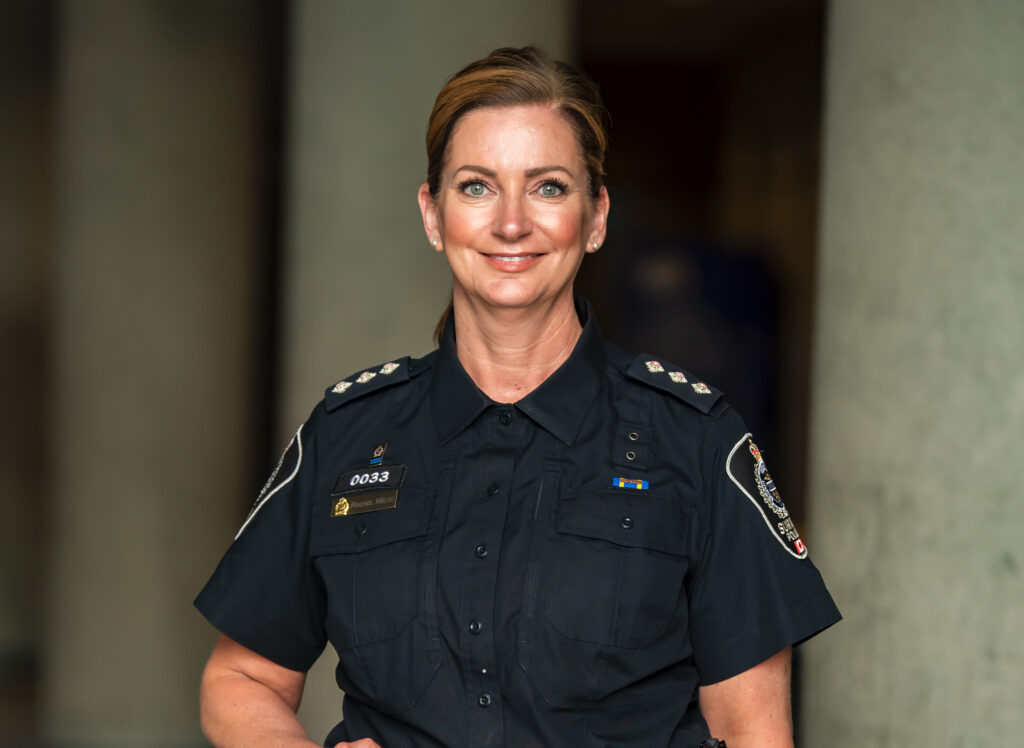 Insp. Rachel Milne, Recruiting Unit. Photo credit: Surrey Police Service
Insp. Rachel Milne, Recruiting Unit. Photo credit: Surrey Police Service In late 2018, the City of Surrey, B.C., embarked on a large-scale, historic policing transition away from the RCMP contract service and toward its own municipal police department. After its establishment in August 2020, the newly formed Surrey Police Service (SPS) was tasked with its first hire, the chief. In the fall of 2021, Chief Constable Norm Lipinski took the helm.
When describing why he took the position as chief of SPS, Chief Lipinski said, “I like to build things, like organizations and systems, and I like to build teams and mentor them. Throughout my career, that’s what I’ve done. I also like working with communities. Surrey is a very large, diverse community, and it’s growing really quickly. There is a lot of opportunity to do good policing.”
Chief Lipinski has a long background in policing, having served with the Edmonton Police Service, the RCMP and the Delta Police Department over the last 42 years. In all three services, Chief Lipinski reached the ranks of deputy chief (EPS and DPD) and assistant commissioner (RCMP). He also obtained his law degree and still holds his licence.
Phase one of Surrey’s policing transition began in November 2021 when SPS began integrating new officers into the Surrey RCMP detachment. By September 2022, SPS will have about 150 officers deployed in B.C.’s second largest city.
Phase two of the policing transition will focus on the change of command from the RCMP to SPS. The timeline for SPS to become the police of jurisdiction has yet to be determined. SPS is currently working to ensure the required policies, procedures, equipment and technology are in place for SPS to take over responsibility for policing in Surrey.
Chief Lipinski has enjoyed the process of building the new service. “Every other week we come up with new things that we need to implement, or new policies to create, or a new training we should add for our officers,” he said.
Starting at the ground floor, Chief Lipinski and SPS hired a team of experienced leaders to map out what needed to be done. From there, they started with fundamentals such as putting a recruiting unit together.
Chief Lipinski contacted Deputy Chief Constable Jennifer Hyland and asked her to consider applying to SPS. Deputy Chief Hyland now leads the support services bureau, which encompasses recruiting, human resources, mental health and wellness, training and leadership development. Chief Lipinski rounded out his executive leadership team with the hires of Deputy Chief Constable Mike LeSage, formerly with the RCMP, and Deputy Chief Constable Todd Matsumoto, formerly with the New Westminster Police Department.
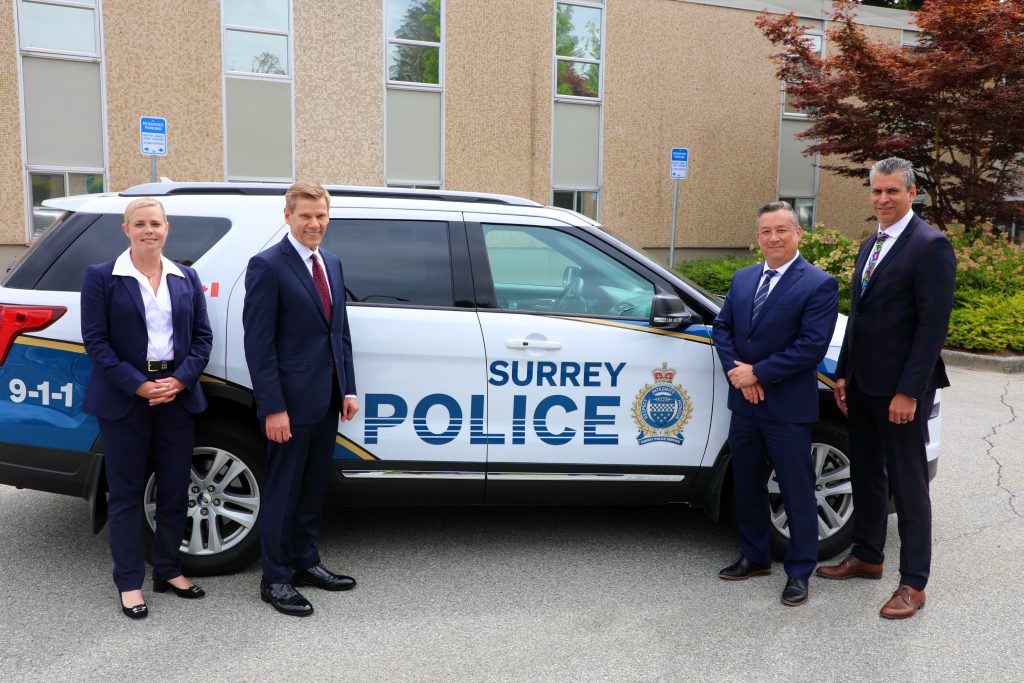
SPS Leadership Team. Photo credit: Surrey Police Service
An influx of experienced and rookie officers
When Deputy Chief Hyland posted the job looking for experienced officers to join the new police service, there was a large influx of applications that flooded in. Deputy Chief Hyland oversees and hires all new SPS members and needed to determine what kind of person would be best suited for the team. This included deciding what values and ethics would be highly prioritized.
“For the first few months, I did nothing but interview experienced officers from other organizations, five interviews a day, five days a week, just to get a core group of people here,” she said. To this day, she still reads every resume and her signature is on every hiring document. She believes that police agencies are made or broken by the human beings that comprise them.
As they select their new recruits, they are looking for people who want to take part in a community policing model. This is an important aspect that Chief Lipinski looks for. He said, “I am a big fan of community policing. For our recruits, we are looking for people who already have a background in community service, and who want to continue giving back.”
As of mid-August 2022, SPS has hired 261 police officers and 54 civilian employees, already making it the second largest municipal agency in B.C. When hiring is complete, SPS will have in excess of 800 police officers.
The challenges in starting a new service
Soon after Chief Lipinski and Deputy Chief Hyland were hired, the Delta variant of COVID-19 swept across the country, which kept the SPS leadership team from being able to meet. “We weren’t able to be in the same room together, and that made things really hard. You can’t build the same kind of personal connection over a computer screen,” said Deputy Chief Hyland.
A question the leadership team asked was “How do we get to know our employees when we’re not even allowed to be near them?” As a way for SPS members to meet, the department hosted a virtual call for all officers, no matter the rank, to help them get acquainted with one another and ask any lingering questions.
Starting a new police service is a complex task, Chief Lipinski said. The police service needed to work with municipal, provincial and federal levels of government.
“There are a lot of legal agreements in place to have the RCMP detachments in B.C., and we have to look at those legal agreements and make new ones for SPS. It takes a lot of time because all three levels of government are busy, but we learn to work through those challenges. We did finally get momentum about how to do this and to ensure that these legal agreements are in place,” he said.
For Deputy Chief Hyland, one of the main challenges is recruiting officers “in a time when it’s really difficult just to get people to be interested in policing in general.” Add on top of that the fact that the police service doesn’t have a footprint yet, or any kind of reputation. Despite these challenges, there has been significant interest in the once-in-a-career opportunity to join and help build a brand-new police service.
Deputy Chief Hyland is also responsible for getting all the department’s equipment, which ranges from training mats to uniforms to firearms. With the worldwide supply chain challenges brought on by the pandemic, it was hard to procure items needed to start a police service.
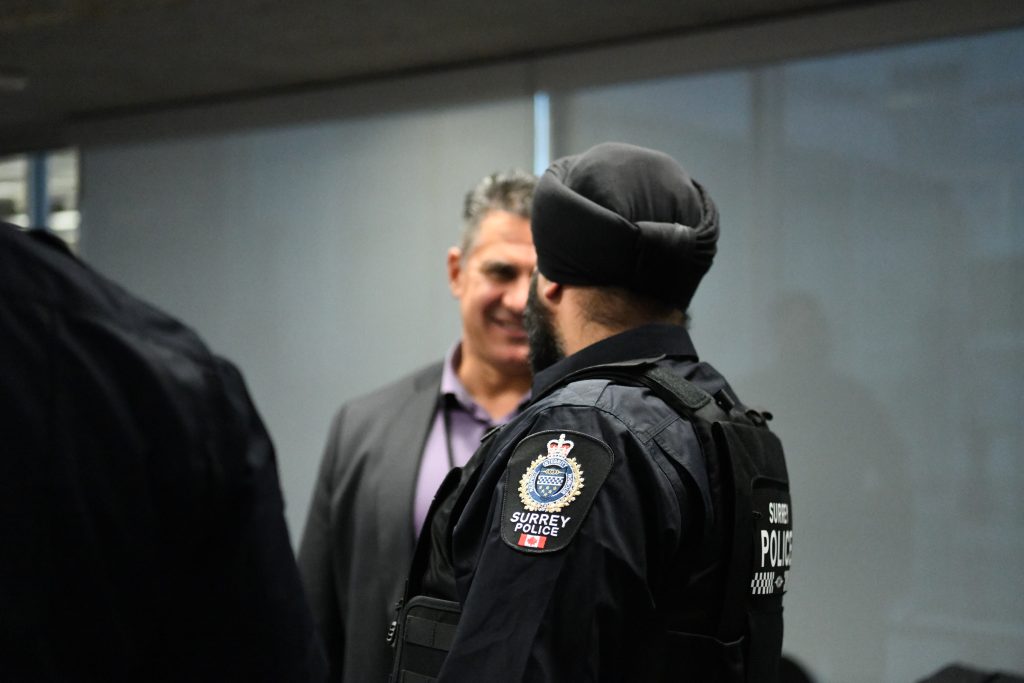
Photo credit: Surrey Police Service
Above and beyond basic training standards
When starting a police service, the leadership team was posed with the challenge of creating a brand-new training program to properly prepare their officers for policing in their community. Something unique to SPS is the fact that in addition to the rookies receiving training, the experienced officers who have transferred from different police departments receive six weeks of training before hitting the streets in Surrey.
Staff Sergeant Kelly Wong, who heads up the leadership development unit, and Staff Sergeant Scott Maglio, who leads the operational skills unit, both recognized that SPS would soon have experienced officers coming from over 20 different police services across the country. S/Sgt. Wong said, “For every experienced officer we hire, we reset their training at zero. Each police department differs in their training, so we provide six weeks of onboarding training so that everyone at SPS is on the same page. They complete all the mandatory training that is listed in the B.C. provincial policing standards guide, and then we add more to that.”
“It’s a next level experience, starting an organization from scratch.” Deputy Chief Constable Jennifer Hyland
“The big thing we want to develop here is, ‘the SPS way of doing things’,” said S/Sgt. Maglio. SPS covers a range of topics for training, including building entry search tactics; officer down assist and rescues; CEW training; a less-lethal launcher program; high risk arrest containment training; a full day of NCO Incident Command training and learning how to deal with a critical incident; and a three-day training course on Gracie survival tactics, which includes Brazilian jiu-jitsu tactics.
The training also includes a full day of integrated communications and tactics training, which includes the B.C. standard crisis intervention and de-escalation (CID) training, but also Integrating Communications Assessment and Tactics (ICAT) training, which focuses on de-escalation.
“In the morning, we give them some tools to be able to deal with someone in crisis. In the afternoon, we bring in professional actors and do reality-based training scenarios. We’ve also worked with the Indigenous community to develop accurate scenarios that include multi-generational trauma, and with the LGBTQIA2+ community,” said S/Sgt. Maglio.
For their pistol training days, the SPS does a full day of Glock pistol training and a two-day carbine requalification course for those members who are already qualified carbine operators. They also put in a full day of operational medicine training, which deals with tourniquets, chest seals and wound packing, and they get their AED CPR recertification that same day.
“We have our instructors pumping red liquid through the training dummies to the wounds, and if the officers don’t pack and dress the wound properly, the red liquid will just keep leaking out. It makes it very realistic,” said S/Sgt. Maglio.
For the new recruits, they go through two weeks of onboarding training with SPS before heading to the Justice Institute of British Columbia (JIBC) for block one of training. “For block two, we take our recruits for the first two weeks and run a patrol basics tactics course, where they receive a lot of the training our experienced officers receive. After the two weeks they continue with their field trainer so they can put their new training to good use,” said S/Sgt. Maglio.
“As we start something brand new, we’re not tied down by the ‘old way’ of doing things. When the leadership team brings me something new to try, we go through a proper authorization process, and then we try it out,” said Chief Lipinski.
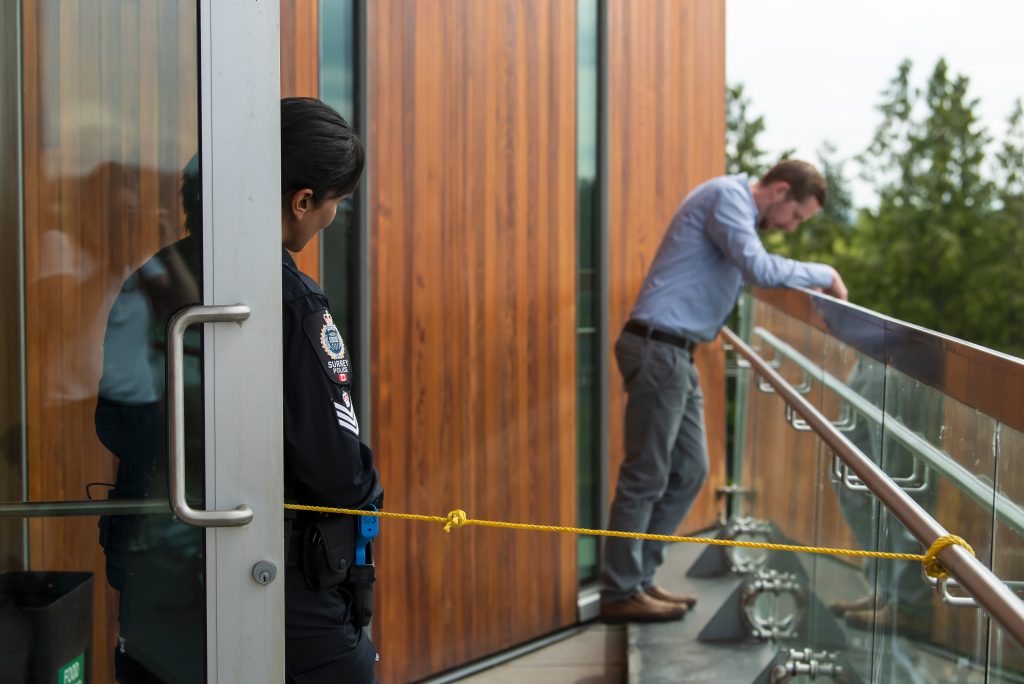
Photo credit: Surrey Police Service
State of the art training facilities
To provide this training, the leadership team needed to find a proper space to deliver it to the SPS members. Currently, the training happens on a previously unused floor of a city-owned building. It’s an open concept floor, and the SPS purchased mobile police straining structures, which are modular-type walls.
“We’ve turned half the floor into our operational skills offices, and then we’ve made two standalone structures on the other half of the floor where we run all our reality-based training. The nice thing about these mobile police training structures is that you can set them up for a morning session, and over lunch they can be moved around so they’re in a completely different layout for the afternoon session,” said S./Sgt. Maglio.
The SPS’s state of the art training facility is currently in development. A large warehouse in Surrey will soon be transformed into a training facility that will include an indoor range, the mobile police training structures, classrooms, matted training areas, and more. “It’s a blank canvas right now, and we’re lucky to be able to plan it out as we need it to be.”
Supporting the development of their staff
The leadership development unit, led by S/Sgt. Wong, is for sworn and civilian SPS members. “We are committed to making leaders who can then be mentors and lead others,” said S/Sgt. Wong. “When officers feel supported, they’re more confident and competent in their roles.”
“Our philosophy is that we’re going to invest in our people, develop and support them from recruitment to retirement and beyond,” said Deputy Chief Hyland. “We want to have our people learn the skills and responsibilities before entering the position.”
The SPS is also creating an investigator development program, which will prepare officers who want to learn about more in-depth investigative techniques for complex major investigations. It will start out by introducing them to different foundational components, like investigative interviewing, interviewing children and writing warrants, and then it will progress through to where they learn more about major case management, how to be a file coordinator, an affiant, a primary investigator, and all the way to becoming an accredited team commander.
This is where SPS sees a difference in their programming from other agencies. “All of the training we develop here will be designed for progressive career development. For our employees, we’re very focused on the longevity of their career,” said S/Sgt. Wong.
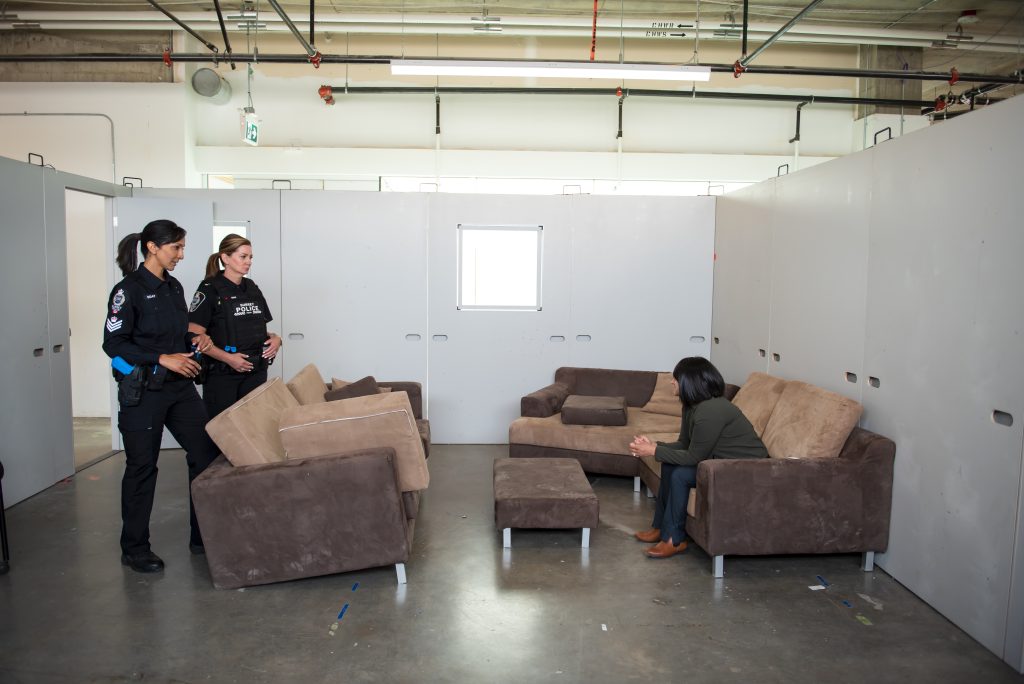
Photo credit: Surrey Police Service
A commitment to officer wellness
SPS puts a high priority on the wellness of their members. As a new team, they are taught to support each other. “It’s quite amazing, the camaraderie and the team atmosphere that we have,” said Chief Lipinski. “It’s important to be able to lean on your colleagues and be able to have the tough conversations if need be.”
SPS has assigned their employee services staff to check in on the members working the streets on a regular basis. “We found that peer-to-peer check ins alongside mental health professionals coming in to speak to each new class is beneficial,” said Chief Lipinski. SPS found that the trick is to have wellness embedded into the fabric of the culture of the organization, right from the beginning, as opposed to waiting for a traumatic incident. SPS also has a dedicated wellness unit, that includes a certified Operational Stress Injury (OSI) dog, a two-year-old Labrador named Ragnar.
“We’re excited to be building a top tier police agency, and it starts with the investment we put into our people and our community,” said Chief Lipinski. “The future for Surrey Police Service and the City of Surrey is truly bright.”
Print this page